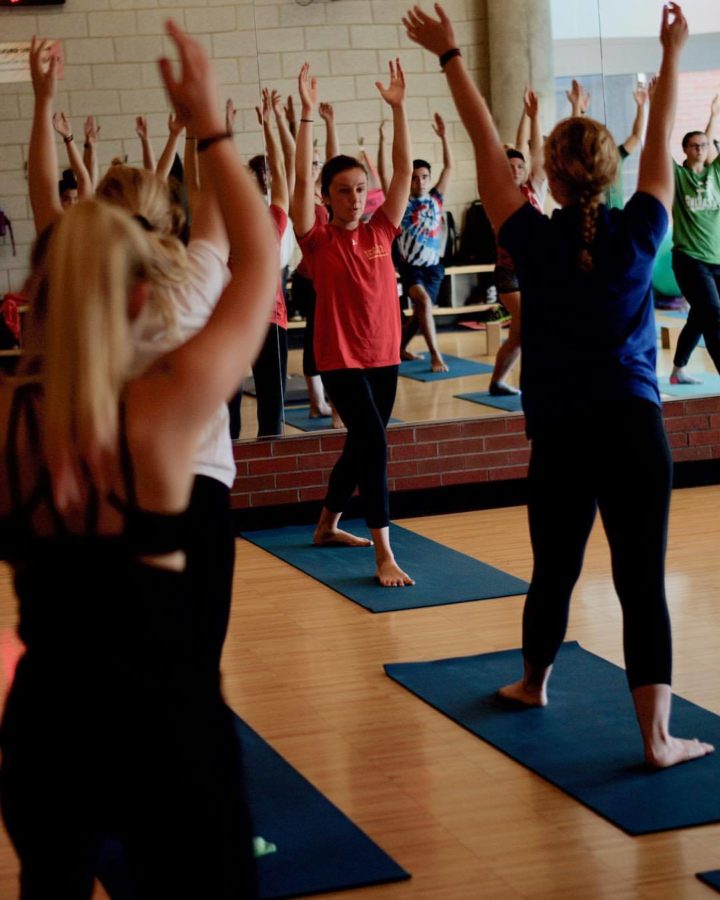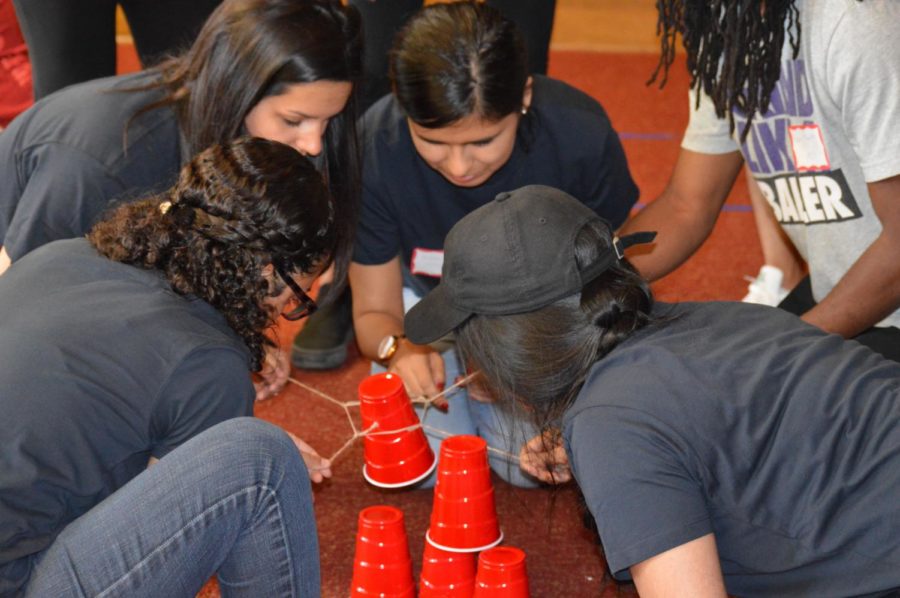Stop trying to fix yourself: advice from State Gym’s personal trainers
Megan Yoga.jpg
October 12, 2017
‘I’ve got to fix myself. I’ve got to change myself. I’ve got to lose weight.’
Nora Hudson has found this to be a common mentality of people beginning an exercise program. Hudson graduated with a Master’s of Science in cardiovascular health and exercise and works as the assistant director of fitness at Iowa State. She said this distortion has stunted the progress and enjoyment of many students trying to better their physical health.
“We are so driven to how we look defines who we are,” Hudson said.
As many as eight out of ten students cite losing weight as the first reason for seeking help in fitness when they walk into Hudson’s office.
These people often think, “I have to kill myself. If it’s not hard, it’s not going to be effective.” Hudson said. This attitude leads to short term success and a short-term commitment to exercise.
Mitch Zaplatosch, the graduate assistant for fitness, has found a similar trend.
“Especially if people are going for that weight loss, you can see people kind of killing themselves trying to get to that point. Whereas that’s kind of discouraging to them especially if they don’t see the results that they want. Whereas if they take a more moderate approach they’re going to feel better during the workouts, they’re going to enjoy it more, and they’re going to want to continue it the long term, which is super important, as opposed to that short-term goal.”
Hudson mentioned one study found that 80 percent of college students within their freshmen year are dissatisfied with how they look. Hudson said this heavy focus on appearance often leaves the enjoyment of exercise overlooked and undervalued.
“Just realizing the consistency and the enjoyment of the activity is the most important, and it’s not the intensity,” Hudson said.
Zaplatosch also found that focusing too much on the scale can be problematic.
“They can get very focused on the numbers, which isn’t always good because fitness is beneficial for so much more than just burning calories,” Zaplatosch said.
Hudson said the scale limits people – the number is either good or bad based on how we interpret it, but it is important to think about the function or quality of life you are trying to improve rather than being concerned with a specific measurement.
Hudson said someone’s weight or BMI doesn’t determine what he or she can do. Just because someone doesn’t have an eight percent body fat content doesn’t mean he or she can’t be strong, and some people who are considered obese run marathons.
A better approach to viewing fitness Hudson offered was viewing the body as a container that serves the internal self. To best serve the internal, Hudson said, we have to take care of it.
The “fix myself” distortion is furthered by other fitness misconceptions.
Hudson said most people’s idea of moderate exercise is actually highly intense exercise. Many people are actually over-exercising.
“Most of the athletes, they’re trying to train in a zone that’s moderate. I think society sends this false message that everyone is working at this high intensity all the time.”
Hudson said the body can adapt to activity five to ten percent greater than its normal routine. For people just starting out, she recommended 15 minutes of light cardio, eight to ten minutes of resistance training of large muscles, and finishing with light stretching.
She’s found that when people start out and think they need to exercise six days a week, their body initially performs more highly due to stress and adrenaline, but it cannot consistently maintain this high level of intensity. When their body can’t do what it could initially, it leads people to feeling as though they’ve failed and quitting, Hudson said.
Zaplatosch has found that some students set too many goals at one time.
“I’d say a lot of people try to do too much at once. They’ll set too many goals and they might be kind of contradictory goals. They’ll say I want to improve my endurance, but I also want to get strong, but I want to lose weight, but I want to gain muscle. They’ll try and do all that at the same time, but really, it’s better to focus on small goals, or one or two goals and really put all the effort towards that. And that’ll encourage them too as they see progress being made.”
Over exercising can lead to physical problems such as joint issues and immune disorders such as chronic fatigue and rheumatoid arthritis Hudson said.
She emphasized that focusing on how you look as opposed to the quality of life you want to have causes you to miss the larger picture.
“The hard part is it gets you stuck. It gets you stuck in being tied to an external and so it never gets you working on the internal that’s really the cause of your disappointment with what’s going on or your misjudging yourself. We see this viscous cycle; it then crosses the road where [fitness] is more harming than helping.”
Hudson said at about four weeks is a vulnerable time for new exercisers. She even said it is part of a gym’s business strategy.
“That’s what most gyms bank on, that 60 percent of everybody who joins will drop out in-between four to six weeks.”
However, if people actually focus on doing exercise they enjoy, they are more likely to stick with it.
“My best advice is to find an activity that makes your body feel more alive and that you can maintain,” Hudson said.
“I’d say focus on what you can do with your body and be proud of the progress you make” Zaplatosch said. “Just small increases you make every day in your progress whether it’s running a little faster, or moving a little more weight, or you’re doing yoga- mastering a new pose, it’s all those little personal records, I guess you could call it, in each workout. It’s all making you better. So really keep that in mind and use that to kind of fuel your work outs for the future.”

















